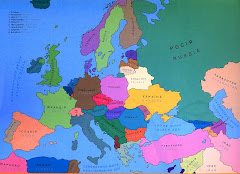
I'm trying to make an adventure out of staying at Peace Corps headquarters in Kiev with a broken arm.
I'm here because I have to be. PC policy. I've been here a week. I can't go back to Starobilsk until the doctors in Washington review my xrays and tell the doctors in Ukraine what they see and what they recommend. So I am trying to make do. I feel a little like Don Quixote on an adventure with no Sancho Panza at my side.
I encounter many interesting people. I join lots of good conversations. I just encountered Peter and Marianne McQuire, for instance. This middle-aged couple is from Georgia Tech country. They are now PCVs teaching at universities in Khargiv. Erica, a young woman at the Close of Service, joins us.
We talk about teaching. We talk about the educational system in Ukraine. They express concern that students here are not taught critical thinking. Just the opposite. Erica adds concern about cheating and the pressure to pass tests.
We talk about the weather, and how hard it is to get heat in winter. Fuel from Russia (gas and oil), on which Ukraine depends, is very expensive, and therefore very precious and doled out with great concern for cost.
That's why some cities don't turn on the central heating system until mid-November, no matter what the temperature outside, Pete says. No matter that it's below freezing and so cold in the schools that kids have to be sent home.
This is the situation in Starobilsk now, I add. Vera, my counterpart at NGO Victoria, emailed me that it is too cold to go into the office. Below zero at night and only up to about 8 degrees celsius during the day. Kids are on vacation until the heat is turned on, she's not sure when that will be.
Mariane says that at her univerity "they turn on the heat only a few hours a night, to keep the pipes from freezing." No heat the rest of the day, during classes, when people are in the building.
"Then why save the pipes," Erica asks. Hmm. Good question! Save the pipes, freeze the people. A catch 22 Ukraine story.
I ask Vasyl, the regional manager for region 6, which includes my oblast, Lugansk, and also Khargiv oblast, about this. He says Ukraine goes through this crisis year after year after year.
On December 31 every year the government makes decisions about gas and oil and prices, and every year it's the same result. Vasyl thinks the government just wants to spoil the holidays that fill the calender in January, beginning with New Year's and orthodox Christmas. It's nothing new. It's the same old thing.
Are there any options? Vasyl says yes, and cites the example of the Baltic countries after gaining their independence. They invested in energy options and self-sufficiency. Why not Ukraine, then? Because of the relationship with Russia. It affects prices and availability. Russia is obsessed with the pipelines and wants to control them. They want to save the pipes for themselves.
Save the Pipes is a cause without a constituency.
All the people want is to be warm in winter, to be able to turn on the heat when the temperature drops to the point where schools and institutions have to be closed and you can't go to work.
Makes sense. But then, common sense is often in short supply when you need it the most. Maybe a common sense solution that meets the needs of the people is just a pipe dream afterall, as Vasyl thinks.
Nah, the Amerikankas say. It's just a matter of time. New leadership. Hope.
"To dream the impossible dream....to right the unrightable wrong....to reach the unreachable star....this is my quest," sings Don Quixote in "The Man from LaMancha," the musical version of Cervantes' novel.
The spirit of Don Quixote lives on in Ukraine, through the quest for adventure of its Peace Corps Volunteers. It might be the best thing we do.





































